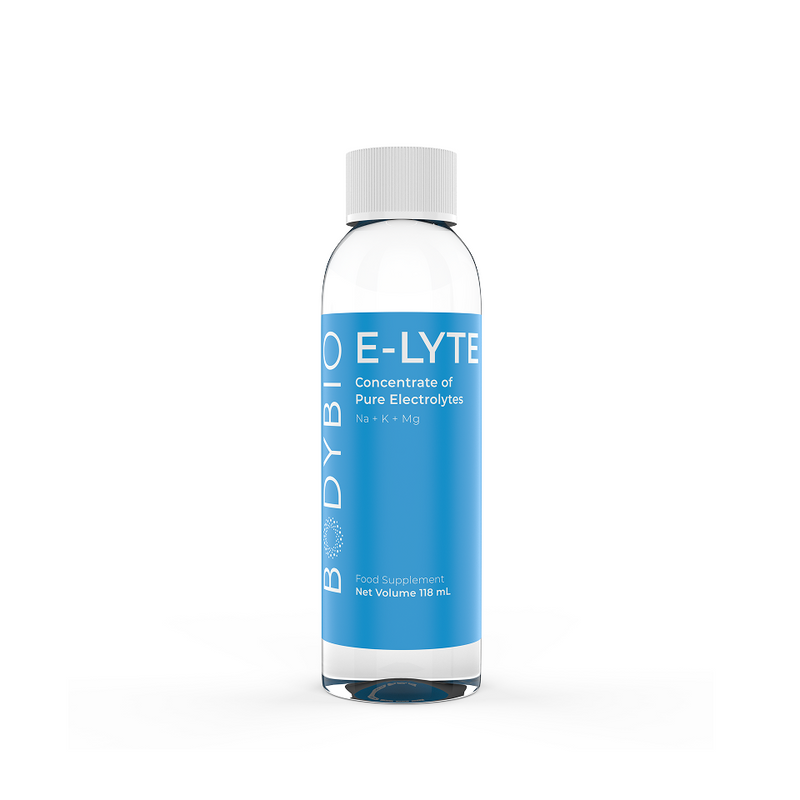The Great Salt Debate: Is Salt the Villain or the Missing Link to Better Health?
Key Takeaways:
For decades, we've been told salt is the enemy. From warnings about high blood pressure to vague advice about “eating clean,” sodium has become a popular scapegoat in modern health narratives.
But what if we’ve had it all wrong?
New research and ancestral wisdom alike are flipping the salt script. The truth is, not all salt is created equal. And the war on sodium might be leaving us depleted, fatigued, and less hydrated than we think. The real enemy? Mineral imbalance.
Enter: electrolytes—the essential charged minerals that regulate hydration, energy, nerve signaling, and cellular function. Two of the cleanest, most balanced solutions on the market today? BodyBio e-lyte and ReMineralize.* (Yep, we’re biased, and here’s why.)
Table of Contents:
- The Truth About Salt: What You Haven’t Been Told
- The Sodium-Potassium See-Saw: Why the Right Balance Is Everything
- The Role of Processed Foods and Refined Salt
- The Electrolyte Equation: Why e-lyte and Remineralize Are Different
-
Final Word: Salt Isn’t the Problem—Mineral Imbalance Is
The Truth About Salt: What You Haven’t Been Told
In 1977, U.S. dietary guidelines warned the public to reduce sodium intake due to a rise in cardiovascular disease. But the science behind that recommendation was flawed. Since then, salt has been demonized, despite mounting evidence that:
- Low sodium intake is linked to increased cardiovascular risk
- Hyponatremia (low blood sodium) is a common reason for ER visits
- Salt depletion can contribute to fatigue, dizziness, insomnia, and anxiety
Salt isn’t the enemy. Rather, mineral balance is the hero we need for better health outcomes. And salt is a big part of maintaining healthy mineral balance.*
The Sodium-Potassium See-Saw: Why the Right Balance Is Everything
Sodium and potassium are biological teammates. They power the sodium-potassium pump—a mechanism that moves ions in and out of our cells to:
- Maintain fluid balance
- Initiate nerve impulses
- Drive muscle contractions
- Support glucose transport and protein synthesis
This pump uses nearly one-third (!) of your body’s total energy (ATP). Sodium is the primary extracellular ion, while potassium dominates inside the cell. When either mineral is out of sync, your cells—and especially your heart and muscles—struggle to function.
Unfortunately, most Americans consume three times more sodium than potassium—the opposite of what our biology prefers.
The Data Doesn’t Lie:
- 90% of U.S. adults consume too much sodium (Cogswell et al., 2012)
- Less than 2% get enough potassium
- Ideal sodium-to-potassium ratio: 1:2 or 1:3
-
High sodium-to-potassium ratios are linked to:
- Hypertension (Elliott et al., 1996)
- Stroke (Ascherio, 1998; Larsson, 2011)
- Kidney stones (Curhan, 2004)
- Increased mortality risk (Yang et al., 2011
Even small improvements to this ratio can significantly benefit cardiovascular and overall health.
The Role of Processed Foods and Refined Salt
Most of the sodium in the American diet doesn’t come from the salt shaker—it comes from ultra-processed foods. These are often loaded with refined table salt (39% sodium) that has been stripped of naturally occurring minerals and laced with anti-caking agents.
Combine this with low intake of potassium-rich foods like fruits and vegetables, and the result is a daily mineral imbalance.
Women average just 50% of the recommended potassium intake; men average 81% (USDA, 2012). The optimal target? 4,700 mg/day. And that’s not considering counteracting deficiency, various states of stress, or different life stages such as pregnancy. In these cases, you may need more for optimal health.
The Electrolyte Equation: Why e-lyte and ReMineralize Are Different
Many Americans consume sodium in the wrong form and miss out on key minerals like potassium and magnesium. That’s where BodyBio e-lyte and Remineralize come in.*
BodyBio e-lyte
Formulated without sugar, flavoring, or artificial additives, e-lyte mimics the body’s natural electrolyte ratio to support:
- Hydration and healthy blood pressure regulation*
- Muscle and nerve function*
-
Recovery from stress, workouts, illness, or heat exposure*
BodyBio Remineralize
Remineralize helps restore trace minerals lost from filtered and RO water. It enhances:
- Cellular conductivity and hydration*
- Zeta potential (electrical charge that keeps fluids moving)*
- Electrolyte absorption and mineral synergy*
Together, these formulas promote mineral homeostasis—without sugar spikes, crashes, or synthetic ingredients.*
Final Word: Salt Isn’t the Problem—Mineral Imbalance Is
The truth is, salt isn’t the villain we’ve made it out to be. What really matters is balance—especially between sodium and potassium. When these key electrolytes are out of sync, hydration suffers, cells struggle, and your long-term health can take a hit.
Ultra-processed foods and stripped-down table salt give sodium a bad name, but your body actually needs high-quality salt and minerals to thrive. Instead of fearing salt, we should be asking: Are we getting enough of the right minerals—in the right forms—to support true hydration and cellular health?
With clean, balanced formulas like BodyBio e-lyte and Remineralize, it’s possible to restore that mineral harmony and hydrate smarter on a cellular level.
Because hydration isn’t about cutting salt—it’s about upgrading your minerals.
Learn more about electrolytes and maintaining proper balance.
More articles on electrolytes and hydration:








